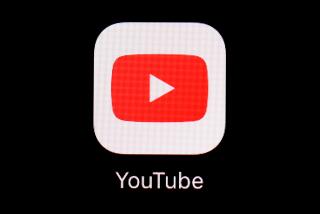Sony BMG, Grokster Join Forces
- Share via
Breaking from the rest of the entertainment industry, record giant Sony BMG is cooperating with the Grokster file-sharing network on a venture that combines free music sampling with paid downloads.
Dubbed “Mashboxx,” the venture marks a surprising alliance between a major record label and an online network that the entertainment industry has blamed for rampant piracy.
The initiative reflects the growing interest among record labels and movie studios to harness -- rather than fight -- the popularity of file sharing.
The effort drew a skeptical response from some file-sharing advocates, however, who said Sony BMG wasn’t really embracing the “peer to peer” technology that millions of people use every day to copy music for free.
Although many of the details are still in flux, people familiar with Mashboxx said that it would probably work like this: When users search for a Sony BMG track, the system will allow them to download only authorized versions of the song.
In some cases, these could be free promotional tracks that come with an offer to buy higher-quality renditions of the music. Mashboxx hasn’t set any prices. Many online music stores sell songs for 99 cents each.
The idea behind the venture is to let people continue to use file sharing to discover music at no charge, while encouraging them to pay for the songs they want to keep.
Some of the technology for Mashboxx probably will come from Snocap Inc., a start-up launched by Shawn Fanning -- the college dropout who created the pioneering Napster file-sharing network. Mashboxx is being run by Wayne Rosso, a file-sharing firebrand given to rhetorical flourishes about ignorance and evil in the entertainment industry.
Rosso and executives at Sony BMG, Grokster Ltd. and Snocap all declined to comment. Sony BMG was created last summer by the merger of the music divisions of Sony Corp. and Bertelsmann.
Music industry insiders noted that Mashboxx was one of several new efforts to convert file sharing into legal downloading.
“There’s a lot of serious effort on the label side of the table to try to make this work, more than you would have ever expected to see,” said one record company executive who asked not to be named. “There’s some heavy lifting, but everybody’s really talking through the possibilities.”
At the same time, though, the Recording Industry Assn. of America continues to fight illegal downloads. The trade group said Thursday that it had filed lawsuits alleging copyright infringement against 750 users of file-sharing networks, pushing the total sued to more than 6,000.
At least one other file-sharing company has agreed to embrace Mashboxx, a music-industry source said. Executives at several others said they wouldn’t participate but were encouraged by the cooperation between their industry and the corporations that supply the content.
“That’s great that they’re at least trying to experiment,” said Michael Weiss, chief of Streamcast Networks Inc., which distributes Morpheus. “I’d like to see more experimentation and find out what really does work.”
The difficulty, said Weiss and executives at two other file-sharing companies, is that users are likely to abandon any file-sharing network that restricts their downloading in favor of the many networks that don’t. “I think the right approach is to take consumers’ behavior as it is and try to leverage that,” he said.
The entertainment industry and file-sharing companies have been at each others’ throats since Fanning rolled out the original Napster in 1999. But both sides say they’re now engaged in extensive discussions about working together.
A file-sharing trade group is proposing to compensate copyright holders through advertising revenue, subscription fees and paid downloads. Like Mashboxx, the Distributed Computing Industry Assn.’s approach relies on technology that can identify files and set rules for how they can be shared.
The impetus for the Mashboxx project, sources said, comes from Sony BMG Chief Executive Andrew Lack, a cost-cutting former NBC and CBS executive whom Sony hired in 2003 to right its listing music division. Hoping to broaden the appeal of Mashboxx, Lack has urged leaders of other record firms to join him in supporting the initiative.
Some crucial issues remain, including pricing and what form the promotional tracks should take. Another thorny issue is what to do about files from other companies’ catalogs -- for example, whether users would be free to share a movie or a video game.
Times staff writers Chuck Philips and Joseph Menn contributed to this report.
More to Read
The biggest entertainment stories
Get our big stories about Hollywood, film, television, music, arts, culture and more right in your inbox as soon as they publish.
You may occasionally receive promotional content from the Los Angeles Times.











